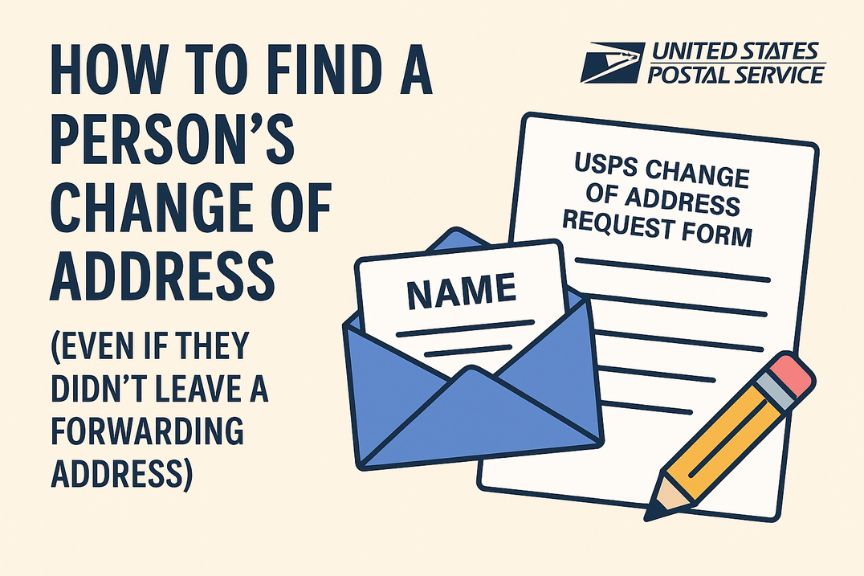
When someone moves and you need to find them, it can feel impossible. Maybe you need to serve court papers, collect a debt, or reconnect with a family member. People move without notice all the time, leaving others stuck wondering where to turn.
As a licensed private investigator, I help people locate new addresses legally and quickly. Here’s how you can do it too — starting with what the U.S. Postal Service allows and what to do when that’s not enough.
How USPS Handles Change of Address Information
When a person files a Change of Address request, the USPS keeps that forwarding address on record for 12 months. If you have a valid reason, you can ask the post office to share it using the USPS Change of Address or Boxholder Request Form.
This official form is what postmasters use to determine whether they can release forwarding information.
📩 Download the Official USPS Change of Address Request Form (PDF)
If you need this form, you can get it below.
Download the form instantly after entering your email:
Download the Official USPS Change of Address Request Form (PDF)
If someone moved and you need to find their new address, this is the official USPS form used to request forwarding information. Enter your email below to get instant access to the form and simple step-by-step instructions on how to use it legally to request a forwarding address. After submitting, you’ll be redirected to the download page.
This is the same document people use to request forwarding address information for legal or personal matters.
Learn more:
How Private Investigators Locate People Who Move
Skip tracing is a professional process used by private investigators to locate people who have moved or gone missing.
I use secure databases, court filings, and verified address records that aren’t available to the public.
This method is fast, accurate, and completely legal. It’s especially useful for:
Child custody or divorce cases
Debt recovery or judgment collection
Serving legal documents
Reconnecting with family or friends
You’ll receive a verified current address — often within 24 hours.
Step-by-Step: Legal Ways to Find a New Address
Here are several ways to locate someone who moved, depending on your situation:
Submit a USPS forwarding request form (Change of Address or Boxholder Request).
Search court or property records to see if they updated their address.
Hire a private investigator for a verified skip trace.
Be cautious with online tools — most public people-search sites sell incomplete or outdated data.
Always verify the address before using it for legal service or contact.
If you already know the person’s vehicle information, you can also run a License Plate Lookup for additional address leads.
Protect Your Own Address Information
It’s easy to forget that while you’re searching for someone’s address, your own information might also be exposed online.
Sites like Whitepages, Spokeo, and BeenVerified often display personal data without permission.
If you’d like to remove your own information from these databases, use DataSeal, a privacy service that automatically opts you out of people-search sites.

Case Example: When a Father Needed to Find His Children
A father contacted me after his wife left suddenly, taking their two children to an unknown location.
He wanted to file for custody, but the court required that she be served with legal papers before the case could proceed.
Weeks later, he received a notice from the post office that she had submitted a forwarding address — but her new location wasn’t listed.
Following the correct USPS process, he submitted the Change of Address or Boxholder Request Form along with court documents proving the active custody case.
Once the post office verified the request, they provided the new forwarding address.
He was then able to serve the papers and move forward with his custody petition.
Stories like this show that understanding how to legally request address information can make all the difference.
If you’re in a similar situation and need help locating someone, I can assist.
Summary: What to Do Next
If someone moved and you can’t reach them, you have three legal options:
Request their forwarding address through USPS using the official form.
Hire a professional investigator to perform a skip trace for fast, verified results.
Protect your own privacy by removing your personal data from public sites with DataSeal.
🚀 Need to locate someone who moved?
Get results fast — from a licensed investigator.
FAQs
Can USPS give you someone’s new address?
Yes, but only under specific legal circumstances and with proper documentation.
How long does USPS keep forwarding addresses?
Usually for 12 months after the person moves.
What if USPS denies my request?
You can still locate the person through professional skip tracing services.